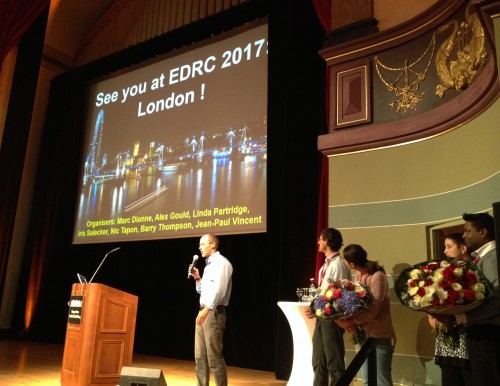EDRC 2015 Meeting report: “Ich hab mein Herz in Heidelberg verloren”
Posted by Jerome Korzelius, on 8 October 2015
Hundreds of fly researchers from Europe and around the world gathered in the picturesque German city of Heidelberg to attend the European Drosophila Research Conference or EDRC. The local organizers held the meeting at the beautiful historic “Stadthalle”(City Hall) of Heidelberg. I will briefly highlight some of the work that was presented at this meeting, although I will never be able to grasp the full width of topics. From neurobiology to population genetics, the program covered almost all disciplines in which this little fly has shown its strength over decades of research.
Before the official kickoff, the meeting had several interesting workshops. My personal favorite was the gut workshop, which covered the Drosophila intestine as a model for adult stem cell biology and immunity. Talks by Saskia Suijkerbuijk on cell competition in Apc mutant tumors in the gut, Maria Dominguez on the transcription factor Escargot and the micro-RNA miR-8 in stem cell identity and motility and beautiful live imaging of midgut stem cells from Lucy O’ Brien’s lab were but a few of the highlights from this session.
The meeting officially started with an EMBO plenary talk by Nobel-prize winner Eric Wieschaus about his long-time passion: embryonic gastrulation. A talk with beautiful movies and modeling approaches showed just how multidisciplinary the field of developmental biology has become. Next, Linda Partridge talked about the mechanisms of aging in a way that crossed organism boundaries to highlight both the history and the future development of this field. The meeting had a very strong plenary lecture program with Gero Miesenboeck, Andrea Brand, Herbert Jaeckle, Trudy Mackay and Norbert Perrimon highlighting Drosophila’s strength in their respective fields.
The Drosophila field keeps renewing due to the rapid development and adaptation of novel techniques. The low cost of Drosophila maintenance allows for genome-wide transgenic resources being available to the community. A great example at the EDRC was the collaborative effort to tag all protein-coding genes with GFP from the Schnorrer, Tomancak,Vijayraghavan, Sarov and Knust labs. Furthermore, Filip Port from the Bullock lab reported on various efforts to optimize CRISPR/Cas9 in Drosophila.
Obviously, it was evident for most of the audience that Drosophila is a great model organism. However, Andreas Prokop from the Manchester Fly Facility reminded us that it is of crucial importance to communicate Drosophila research to a wider audience as well. He highlighted several excellent outreach activities organized at schools as well as many resources generated by the Fly Facility that are made available to use as teaching tools. Check out his presentation on F1000Research Slides.

Poster sessions and lunches with rich German cuisine provided ample opportunity to talk science and catch up with colleagues. The meeting ended with the announcement where the next EDRC will be held: in 2 years time it will be London Calling to all Drosophilists!


 (No Ratings Yet)
(No Ratings Yet)